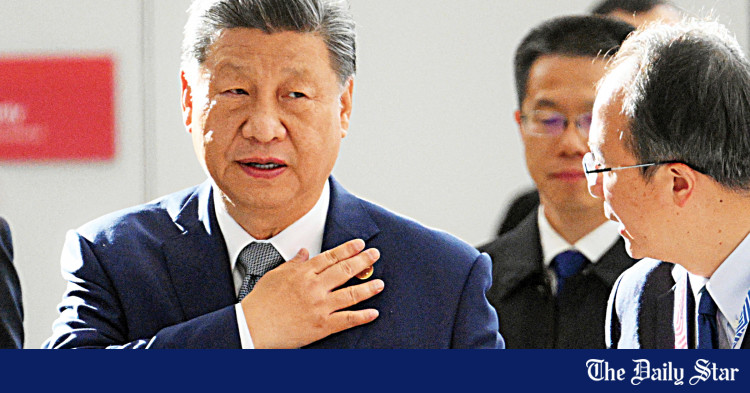US, China accuse each other of stoking regional tensions

Top US and Chinese officials exchanged warnings against stoking regional tensions during a meeting in Beijing yesterday after China became embroiled in security rows with American allies Japan and the Philippines.
US National Security Advisor Jake Sullivan, making the first such trip by someone in his role since 2016, and Chinese top diplomat Wang Yi met in Beijing for talks that were meant to smooth over relations.
But after their meeting, state media reported that Wang cautioned Washington against supporting the Philippines in the disputed South China Sea.
"The United States must not use bilateral treaties as an excuse to undermine China's sovereignty and territorial integrity, nor should it support or condone the Philippines' actions of infringement," Wang told Sullivan, according to state broadcaster CCTV.
Sullivan, who is US President Joe Biden's most senior security aide, doubled down on Washington's pledges to defend its regional partners.
"Mr Sullivan reaffirmed the United States' commitment to defending its Indo-Pacific allies," the White House said in a readout of their meeting.
Sullivan also "expressed concern about the PRC's destabilizing actions against lawful Philippine maritime operations in the South China Sea", it said, using an acronym for the People's Republic of China.
Sullivan landed in the Chinese capital on Tuesday for a three-day trip, saying on arrival he looked forward to "a very productive round of conversations" with foreign minister Wang.
The visit follows a summit between Biden and Chinese President Xi Jinping in California in November 2023, and comes just over two months before elections in the United States.
But the meeting was shadowed by Washington's allies Japan and the Philippines blaming China in the past week for raising regional tensions.
Beijing said on Monday it had taken "control measures" against two Philippine Coast Guard ships that "illegally" entered an area of disputed reefs and waters.
Manila said the Chinese vessels had prevented Philippine ships from resupplying their own coast guard vessels in the area, blasting the move as "aggressive" and calling Beijing the "biggest disrupter" of peace in Southeast Asia.
According to CCTV, Wang emphasised to Sullivan that "China is firmly committed to safeguarding its territorial sovereignty and maritime rights over the South China Sea islands".
Tokyo meanwhile accused Beijing of violating its airspace on Monday, with a two-minute incursion by a surveillance aircraft off the Danjo Islands in the East China Sea.
It said the first confirmed incursion by a Chinese military aircraft into its airspace was a "serious violation" of its sovereignty and accused Beijing of becoming "increasingly active".
Sullivan and Wang have met five times over the past year-and-a-half -- in Washington, Vienna, Malta and Bangkok, as well as alongside US President Joe Biden and Chinese leader Xi Jinping at a November 2023 summit in California.
The US and Chinese officials also discussed the tense issue of Taiwan, the self-governing democracy that China claims.
China has kept up its sabre-rattling since the inauguration this year of President Lai Ching-te, whose party emphasises Taiwan's separate identity.
Wang stressed that Taiwan belonged to Beijing and that China will "certainly be unified".
He told Sullivan that the US should "put into practice its commitment not to support Taiwan independence" and stop arming Taiwan, according to CCTV.
The White House said Sullivan "underscored the importance of maintaining peace and stability across the Taiwan Strait."
The US and Chinese officials also discussed issues including Ukraine, the Middle East and the Korean Peninsula, both sides said.
Sullivan had "emphasized concerns" about China's support for Russia's defence industry during Moscow's invasion of Ukraine, the White House said.
Wang countered that China was committed to "working towards a political solution to the Ukraine crisis" and warned Washington off imposing "illegal unilateral sanctions."
Top US and Chinese officials exchanged warnings against stoking regional tensions during a meeting in Beijing yesterday after China became embroiled in security rows with American allies Japan and the Philippines.
US National Security Advisor Jake Sullivan, making the first such trip by someone in his role since 2016, and Chinese top diplomat Wang Yi met in Beijing for talks that were meant to smooth over relations.
But after their meeting, state media reported that Wang cautioned Washington against supporting the Philippines in the disputed South China Sea.
"The United States must not use bilateral treaties as an excuse to undermine China's sovereignty and territorial integrity, nor should it support or condone the Philippines' actions of infringement," Wang told Sullivan, according to state broadcaster CCTV.
Sullivan, who is US President Joe Biden's most senior security aide, doubled down on Washington's pledges to defend its regional partners.
"Mr Sullivan reaffirmed the United States' commitment to defending its Indo-Pacific allies," the White House said in a readout of their meeting.
Sullivan also "expressed concern about the PRC's destabilizing actions against lawful Philippine maritime operations in the South China Sea", it said, using an acronym for the People's Republic of China.
Sullivan landed in the Chinese capital on Tuesday for a three-day trip, saying on arrival he looked forward to "a very productive round of conversations" with foreign minister Wang.
The visit follows a summit between Biden and Chinese President Xi Jinping in California in November 2023, and comes just over two months before elections in the United States.
But the meeting was shadowed by Washington's allies Japan and the Philippines blaming China in the past week for raising regional tensions.
Beijing said on Monday it had taken "control measures" against two Philippine Coast Guard ships that "illegally" entered an area of disputed reefs and waters.
Manila said the Chinese vessels had prevented Philippine ships from resupplying their own coast guard vessels in the area, blasting the move as "aggressive" and calling Beijing the "biggest disrupter" of peace in Southeast Asia.
According to CCTV, Wang emphasised to Sullivan that "China is firmly committed to safeguarding its territorial sovereignty and maritime rights over the South China Sea islands".
Tokyo meanwhile accused Beijing of violating its airspace on Monday, with a two-minute incursion by a surveillance aircraft off the Danjo Islands in the East China Sea.
It said the first confirmed incursion by a Chinese military aircraft into its airspace was a "serious violation" of its sovereignty and accused Beijing of becoming "increasingly active".
Sullivan and Wang have met five times over the past year-and-a-half -- in Washington, Vienna, Malta and Bangkok, as well as alongside US President Joe Biden and Chinese leader Xi Jinping at a November 2023 summit in California.
The US and Chinese officials also discussed the tense issue of Taiwan, the self-governing democracy that China claims.
China has kept up its sabre-rattling since the inauguration this year of President Lai Ching-te, whose party emphasises Taiwan's separate identity.
Wang stressed that Taiwan belonged to Beijing and that China will "certainly be unified".
He told Sullivan that the US should "put into practice its commitment not to support Taiwan independence" and stop arming Taiwan, according to CCTV.
The White House said Sullivan "underscored the importance of maintaining peace and stability across the Taiwan Strait."
The US and Chinese officials also discussed issues including Ukraine, the Middle East and the Korean Peninsula, both sides said.
Sullivan had "emphasized concerns" about China's support for Russia's defence industry during Moscow's invasion of Ukraine, the White House said.
Wang countered that China was committed to "working towards a political solution to the Ukraine crisis" and warned Washington off imposing "illegal unilateral sanctions."














